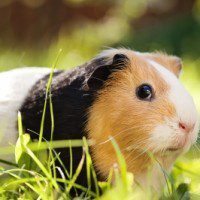Are you looking for a small but adorable pet? A Guinea pig—or cavy, as they are also called—may be a great choice! These little furballs are super cute and lots of fun! Here, a Tampa, FL vet discusses basic Guinea pig care.
Cage
Since your pint-sized pal will spend most of his time in a cage, it’s important to make sure that his home is comfy, clean, and fun. We recommend getting a cage that is at least 7.5 feet for one Guinea pig. Choose one with a solid bottom. To increase your tiny pal’s floor space, get a two-story one. You’ll need to incorporate a hidey-hole, food dishes, a water bottle, and, of course, lots of toys. You can include a litterbox and hay rack as well. Last but not least, your cavy will need a safe, suitable substrate, such as aspen. Fleece blankets also work. Avoid pine and cedar products, as they aren’t safe for small animals. Ask your vet for more information.
Food
Your miniature furball can have commercial cavy food for breakfast and dinner. You’ll want to supplement this with grass hay and fresh produce. Include lots of options that include Vitamin C, which is crucial for Guinea pigs. Ask your vet for specific recommendations, including portion sizes, safe and unsafe foods, and suitable treats.
Toys
Guinea pigs have open-rooted teeth, which means they must chew quite a bit to prevent dental problems. You can make many cute pet toys out of ordinary household items. Many wood, wicker, cardboard, and paper items are fine. Just avoid anything with small parts or sharp edges, and items coated in varnish, glitter, or dye. (Tip: the cardboard tubes from toilet paper rolls make great cavy playthings!)
Tricks
Did you know that Guinea pigs can learn some adorable tricks? You may be able to teach your little furball to turn in circles, come when called, or return to their cage on command. Be patient, consistent, and gentle.
Veterinary Care
Just like any other pet, Guinea pigs should see a vet at least once a year. In between visits, watch for signs of illness, such as reduced appetite, unusual vocalizations, and coughing. Call your vet immediately if you notice anything amiss.
Please call us, your Tampa, FL pet clinic, with any questions or concerns about your pet’s health or care. We are here to help!







